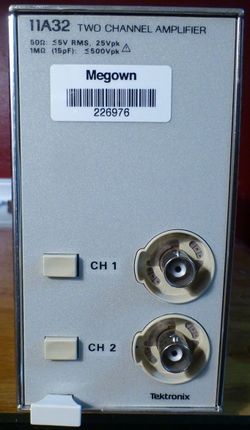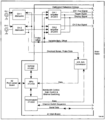11A32: Difference between revisions
No edit summary |
No edit summary |
||
| Line 27: | Line 27: | ||
and the combined signal is presented to the mainframe via the plug-in interface connector. | and the combined signal is presented to the mainframe via the plug-in interface connector. | ||
The same is true of the trigger outputs of both amplifiers. | The same is true of the trigger outputs of both amplifiers. | ||
This is possible because | This is possible because regardless of whether the amplifier's output is enabled: | ||
* each amplifier's output has a source impedance of 100 Ω so the two amplifiers in parallel match the 50 Ω spec of the [[11000 Series plug-in interface]]. | |||
* | * each amplifier's nominal common-mode output voltage is zero (without signal input) | ||
* | * each amplifier's nominal differential output voltage is zero (without signal input) | ||
See the block diagram below. | See the block diagram below. | ||
Revision as of 07:38, 25 December 2022
The Tektronix 11A32 is a 400 MHz dual-channel amplifier plug-in for 11000-series scopes. Each of the attenuator modules contains an M474 buffer amplifier. Each of the attenuator modules feeds an M377 amplifier IC. The output signals of the two M377s combine at the output of the 11A32. The fine steps between the deflection ranges are calibrated in 1% increments.
The 11A32 uses the same firmware as the 11A34.
The display output of the channel 1 M377 amplifier (A1U310) is in parallel with the display output of the channel 2 M377 amplifier (A1U410) and the combined signal is presented to the mainframe via the plug-in interface connector. The same is true of the trigger outputs of both amplifiers. This is possible because regardless of whether the amplifier's output is enabled:
- each amplifier's output has a source impedance of 100 Ω so the two amplifiers in parallel match the 50 Ω spec of the 11000 Series plug-in interface.
- each amplifier's nominal common-mode output voltage is zero (without signal input)
- each amplifier's nominal differential output voltage is zero (without signal input)
See the block diagram below.
Key Specifications
| Bandwidth | DC to 400 MHz plus 100 MHz and 20 MHz BWL filters |
|---|---|
| Rise time | 875 ps in 1 GHz mainframe such as the 11402, 11402A, 11403, 11403A, DSA601A, or DSA602A |
| Deflection | 1 mV to 10 V per division in 1% calibrated steps |
| Input impedance | 50 Ω or 1 MΩ |
| Features |
|
Internals
The 11A32 and 11A34 were originally intended to use Intel 8052 microcontrollers. However, during development, the firmware swelled beyond that chip's 8192-byte maximum on-chip ROM size. Doug Haines found an alternate supplier of 8051-compatible chips (OKI Semiconductor) that offered a 16Kbyte on-chip ROM, and that's what the plug-ins wound up with. The finished code size wound up at about 14 KB.
The 11A32 also contains a DS1120 NVRAM and an ACVS sample and hold module.
Links
Pictures
-
-
-
Block diagram
-
11A32 Main Board Schematic
-
11A32 Main Interface
-
left side internal
-
right side internal
Custom ICs used in the 11A32
| Page | Model | Part nos | Description | Designers | Used in |
|---|---|---|---|---|---|
| M377 | M377 | 165-2129-03 • 165-2089-06 • 155-2089-05 | amplifier | John Addis | 11A16 • 11A32 • 11A33 • 11A34 • 11A52 • 2245 • 2245A • 2247 • 2247A • 2252 • TDS410 • TDS420 • TDS460 • TDS520D • TDS540D • TDS580D • TDS680C • TDS684C • TDS714L • TDS724D • TDS754D • TDS784D |
| M474 | M474 | amplifier | John Addis • Ivan John Cousins | 11A32 • 11A34 |





